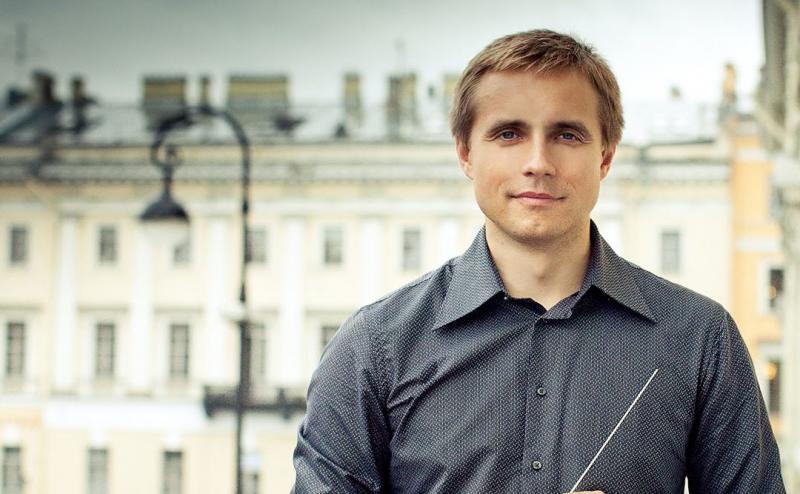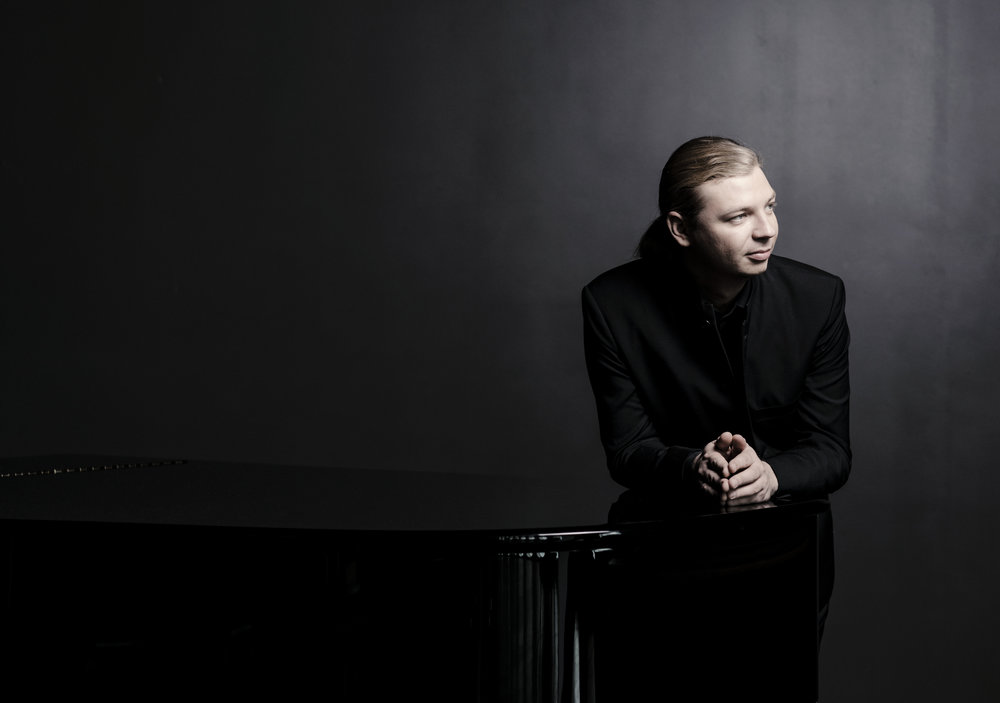Kozhukhin, RPO, Petrenko, RFH review - more cultured than electrifying | reviews, news & interviews
Kozhukhin, RPO, Petrenko, RFH review - more cultured than electrifying
Kozhukhin, RPO, Petrenko, RFH review - more cultured than electrifying
Brahms within bounds and smooth Strauss in a well-measured romantic double bill

With two German giants roaring - Brahms in leonine mode, Richard Strauss more with tongue in armour-plated cheek - it could have all been too much.
Indeed, you felt this team could have gone on to give us from Brahms's First Piano Concerto to give us the equally titanic Second. I've heard that pairing work in concert with the magisterial Elisabeth Leonskaja, and there's no doubt that when Yefim Bronfman played the Second with Vladimir Jurowski in the Royal Festival Hall last month, the sequels - sparkling humour in the form of Strauss's Till Eulenspiegel, offspring of the concerto's witty finale, and Elgar's Falstaff - showed more thoughtful programme planning than last night's standard.
Both pianists are titans with a twinkle. Kozhukhin (pictured below) uses an immaculate technique to keep it all within bounds, only busting out with impressive tirades of double octaves. He's a pianist who tunes in to what's going on around him - that was even more evident in a fabulous performance of Prokofiev's concertante-style Fifth Piano Concerto with Mirga Gražinytė-Tyla and the Ciy of Birmingham Symphony Orchestra in Basingstoke a month ago. To hear him build Brahms's elaborate piano treatment of the first movement's lovely lyrical counter-subject second time around was a masterclass in subtle musicianship.  Uniquely crystalline in the Adagio's more troubled meditation, Kozhukhin was underpinned by silky-strong cellos and basses full of presence. Petrenko knows how to manipulate atmosphere, even if the orchestral introduction nearly fell through sinkholes in its craggy landscape. What a flawless masterpiece this is, though, its endless thematic inventiveness seeming to flow from a pure spring. Kozhukhin took us right back to the source in the ineffable vanishing act of his tiny encore, Grieg's "Arietta", announcement of which brought a shriek of approval from what I presume was a Norwegian in the audience.
Uniquely crystalline in the Adagio's more troubled meditation, Kozhukhin was underpinned by silky-strong cellos and basses full of presence. Petrenko knows how to manipulate atmosphere, even if the orchestral introduction nearly fell through sinkholes in its craggy landscape. What a flawless masterpiece this is, though, its endless thematic inventiveness seeming to flow from a pure spring. Kozhukhin took us right back to the source in the ineffable vanishing act of his tiny encore, Grieg's "Arietta", announcement of which brought a shriek of approval from what I presume was a Norwegian in the audience.
That Petrenko's interpretation of Strauss's Ein Heldenleben (A Hero's Life) on the 155th anniversary day of the composer's birth was going to be a treat seemed assured by his superlative new recording with his Oslo Philharmonic. This could have done perhaps with one more rehearsal to smooth out just a few awkward turns, and the London relationship is still in its early days, but the later stages were as fine as I've ever heard them. Confession: as a veteran of endless Strauss performances, this is the only tone-poem which no longer works for me, at least until the two-thirds mark, once mock-hero Strauss's exuberant battle against his critical adversaries is fought and won. Earlier, there was much to admire in leader Duncan Riddell's elegant portrayal of the Hero's Companion - Pauline Strauss in all her moody variety - and the silk-sheets aftermath of the love scene once again gave us the Petrenko brand of soft magic (a quiet audience always helps).
Yet it was in the billowing new confidence of the Hero's homecoming and the tapestry of Strauss's own favourite hits up to 1899, "The Hero's Works of Peace", that the performance soared. And how gilded, too, by the young principals of the RPO's superb wind department, especially oboist John Roberts - a bright new star on the orchestral scene - and clarinettist Katherine Lacy. Four-part muted cellos at the start of the reminiscences compelled attention; the nightmare visions which ruffle the peace of the protagonist's personal sunset made the hair stand on end - how extraordinary these must have sounded at the end of the 19th century. Though it has some way to go in collective personality, the RPO will probably find it with Petrenko, and its essential handsomeness provides a firm launchpad from which late romantic works like these can truly fly.
rating
Share this article
The future of Arts Journalism
You can stop theartsdesk.com closing!
We urgently need financing to survive. Our fundraising drive has thus far raised £49,000 but we need to reach £100,000 or we will be forced to close. Please contribute here: https://gofund.me/c3f6033d
And if you can forward this information to anyone who might assist, we’d be grateful.

Subscribe to theartsdesk.com
Thank you for continuing to read our work on theartsdesk.com. For unlimited access to every article in its entirety, including our archive of more than 15,000 pieces, we're asking for £5 per month or £40 per year. We feel it's a very good deal, and hope you do too.
To take a subscription now simply click here.
And if you're looking for that extra gift for a friend or family member, why not treat them to a theartsdesk.com gift subscription?
more Classical music
 Scottish Chamber Orchestra, Ibragimova, Queen’s Hall, Edinburgh review - rarities, novelties and drumrolls
A pity the SCO didn't pick a better showcase for a shining guest artist
Scottish Chamber Orchestra, Ibragimova, Queen’s Hall, Edinburgh review - rarities, novelties and drumrolls
A pity the SCO didn't pick a better showcase for a shining guest artist
 Kilsby, Parkes, Sinfonia of London, Wilson, Barbican review - string things zing and sing in expert hands
British masterpieces for strings plus other-worldly tenor and horn - and a muscular rarity
Kilsby, Parkes, Sinfonia of London, Wilson, Barbican review - string things zing and sing in expert hands
British masterpieces for strings plus other-worldly tenor and horn - and a muscular rarity
 From Historical to Hip-Hop, Classically Black Music Festival, Kings Place review - a cluster of impressive stars for the future
From quasi-Mozartian elegance to the gritty humour of a kitchen inspection
From Historical to Hip-Hop, Classically Black Music Festival, Kings Place review - a cluster of impressive stars for the future
From quasi-Mozartian elegance to the gritty humour of a kitchen inspection
 Shibe, LSO, Adès, Barbican review - gaudy and glorious new music alongside serene Sibelius
Adès’s passion makes persuasive case for the music he loves, both new and old
Shibe, LSO, Adès, Barbican review - gaudy and glorious new music alongside serene Sibelius
Adès’s passion makes persuasive case for the music he loves, both new and old
 Anja Mittermüller, Richard Fu, Wigmore Hall review - a glorious hall debut
The Austrian mezzo shines - at the age of 22
Anja Mittermüller, Richard Fu, Wigmore Hall review - a glorious hall debut
The Austrian mezzo shines - at the age of 22
 First Person: clarinettist Oliver Pashley on the new horizons of The Hermes Experiment's latest album
Compositions by members of this unusual quartet feature for the first time
First Person: clarinettist Oliver Pashley on the new horizons of The Hermes Experiment's latest album
Compositions by members of this unusual quartet feature for the first time
 Gesualdo Passione, Les Arts Florissants, Amala Dior Company, Barbican review - inspired collaboration excavates the music's humanity
At times it was like watching an anarchic religious procession
Gesualdo Passione, Les Arts Florissants, Amala Dior Company, Barbican review - inspired collaboration excavates the music's humanity
At times it was like watching an anarchic religious procession
 Classical CDs: Camels, concrete and cabaret
An influential American composer's 90th birthday box, plus British piano concertos and a father-and-son duo
Classical CDs: Camels, concrete and cabaret
An influential American composer's 90th birthday box, plus British piano concertos and a father-and-son duo
 Cockerham, Manchester Camerata, Sheen, Martin Harris Centre, Manchester review - re-enacting the dawn of modernism
Two UK premieres added to three miniatures from a seminal event of January 1914
Cockerham, Manchester Camerata, Sheen, Martin Harris Centre, Manchester review - re-enacting the dawn of modernism
Two UK premieres added to three miniatures from a seminal event of January 1914
 Kempf, Brno Philharmonic, Davies, Bridgewater Hall, Manchester review - European tradition meets American jazz
Bouncing Czechs enjoy their Gershwin and Brubeck alongside Janáček and Dvořák
Kempf, Brno Philharmonic, Davies, Bridgewater Hall, Manchester review - European tradition meets American jazz
Bouncing Czechs enjoy their Gershwin and Brubeck alongside Janáček and Dvořák
 Solomon, OAE, Butt, QEH review - daft Biblical whitewashing with great choruses
Even a top soprano and mezzo can’t make this Handel paean wholly convincing
Solomon, OAE, Butt, QEH review - daft Biblical whitewashing with great choruses
Even a top soprano and mezzo can’t make this Handel paean wholly convincing
 Two-Piano Gala, Kings Place review - shining constellations
London Piano Festival curators and illustrious friends entertain and enlighten
Two-Piano Gala, Kings Place review - shining constellations
London Piano Festival curators and illustrious friends entertain and enlighten

Add comment